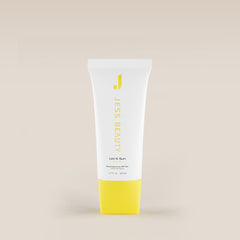We totally get it. With all the different SPF numbers out there, it's natural to wonder if SPF 50+ is really better than SPF 30+. You're not alone! It's okay if you're feeling a little confused about sun protection — it can be tricky to choose the right one for your skin! Understanding the differences can help your skin a lot, and you've come to the right place.
In this blog, we're going to explain what SPF is, why it's important, how it works, and the main differences between SPF 30+ and SPF 50+. Stick with us, and we'll make it easy for you to understand! We're here to help you make the best choices for your skin and keep it safe from those harmful UV rays!
What does SPF mean? What does the number tell us?
SPF, or Sun Protection Factor, measures the effectiveness of sunscreen in protecting the skin from UVB rays. The SPF number indicates how much longer it would take for the skin to burn with sunscreen than without. For example, a sunscreen with an SPF of 30 means that it would take 30 times longer for the skin to burn than without protection.
SPF ratings typically range from 15 to 50+, with higher numbers providing more protection. An SPF 15 sunscreen blocks about 93% of UVB rays, SPF 30 blocks 97%, and SPF 50 blocks about 98%. However, no sunscreen can block 100% of UVB rays.
Why is SPF Important?

- Prevents sunburn: SPF protects the skin from UVB rays, which cause sunburn. Sunburn can leave you burning, peeling, and with long-term skin damage.
- Reduces the risk of skin cancer: Regular use of SPF significantly reduces the risk of developing skin cancer, including melanoma.
- Prevents premature aging: UV rays contribute to premature aging, causing wrinkles, fine lines and age spots. By blocking these rays, SPF helps maintain youthful, healthy skin.
- Protects against UV rays: SPF shields skin from harmful UV rays, reducing: both immediate and long-term damage.
- Prevents hyperpigmentation: SPF helps prevent dark spots and uneven skin tone caused by sun exposure.
- Essential for all skin types: Regardless of skin type or tone, SPF provides essential protection for everyone.
- Maintains overall skin health: Regular use of SPF keeps skin healthy by avoiding various forms of damage that can affect its appearance and function.
- Supports healing processes: For those who use treatments such as peels or lasers, SPF protects healing that new beautiful skin from damage.
- Prevents Dryness: Maintains moisture in the skin barrier, reducing irritation and dryness.
If you choose an SPF like Let it Sun or Sun Drops, you can get even more of those benefits because they contain other antioxidants and nutrients like green tea, centella asiatica and carrot extract to soothe and calm skin.
How Does Sunscreen Work?
Sunscreens work by using active ingredients to protect the skin from the harmful effects of UV rays. There two ways to do so:
- Physical (mineral) sunscreens: These contain active mineral ingredients such as zinc oxide or titanium dioxide. They work by sitting on the skin and reflecting or scattering UV rays away from the skin. These sunscreens work immediately upon application and are less likely to cause skin irritation, making them ideal for sensitive skin.
- Chemical sunscreens: These contain organic (carbon-based) compounds such as oxybenzone, avobenzone, octisalate, octocrylene, homosalate and octinoxate. These ingredients absorb UV radiation, convert it to heat, and then release it from the skin. Chemical sunscreens need to be applied 15-30 minutes before sun exposure to allow them to fully bind to the skin.
Differences Between SPF 30+ and SPF 50+
If we just stick to the numbers, this is the difference:
- SPF 30+: Blocks about 97% of UVB rays.
- SPF 50+: Blocks about 98% of UVB rays.
While the variability in percentage might seem small, SPF 50+ provides a bit more protection, which can be really important for people with very pale skin, or a history of skin cancer, or conditions that make them more sensitive to UV radiation.
When it comes to the amount of time, it’s important to remember that both SPF 30+ and SPF 50+ need to be reapplied every two hours, or more frequently if you're swimming, sweating, or towel-drying. The higher SPF just means you'll be safer from UVB rays for a longer time, if you don’t do any of those things.

Keep it simple: when to use SPF 30 and SPF 50
-
SPF 30+: This is a good choice for most people in everyday situations that don't involve prolonged exposure to the sun, such as going to the office, the gym, or running errands during the day. It's especially helpful when combined with other protective measures such as wearing hats and seeking shade.
And if you use our Sun Drops SPF 30+, you are also hydrating your skin and applying a layer of primer before makeup!
- SPF 50+: If you're going to be outdoors for a long time, or if you have fair skin, rosacea, a family history of skin cancer or other conditions, or are sensitive to the sun, we recommend an SPF 50+. According to your preferences, you can choose Sun Drops SPF 50+ a nourishing serum with a velvety texture that will make your skin glow, or you can go for Let it Sun SPF 50+, a nutritive and refreshing gel with matte touch.
Craving both?

Get complete sun protection with the Sun Safe Box by Jess Beauty. This kit includes the best of the best: Let It Sun SPF 50+ for those high-exposure days and Sun Drop SPF 30+ for daily use. Both have been celebrated as "most innovative SPF" at Cosmoprof Miami. These exceptional formulas are enriched with camellia and aloe vera, which nourish and rejuvenate the skin. These products shield your skin from harmful UV rays while preventing sun damage and premature aging without white residue.








